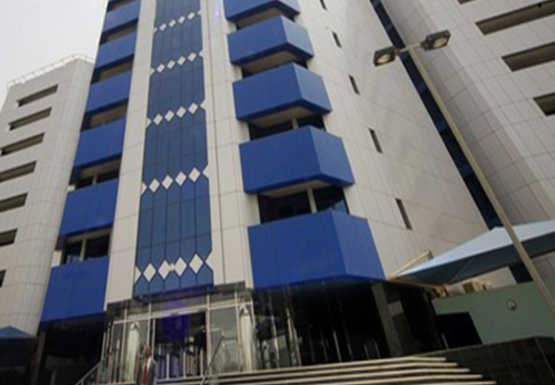Fatwa on bank investment deposits in Sudan

The Central Bank of Sudan in Khartoum (File photo: CBoS)
The catastrophic repercussions of the war that erupted between the Sudanese Armed Forces and the paramilitary Rapid Support Forces in April last year also affects the banking sector in Sudan. Last week, the Supreme Sharia Supervisory Board for Banks and Financial Institutions issued a fatwa regarding dealing with investment deposits in force majeure circumstances.
The large decline in economic activity, industry and infrastructure, the cessation of government and private institutions from paying the salaries of employees, and the weak coverage of communications networks to many areas in the country, including the recent blackout, have severely affected the banking sector, says Dabanga journalist and researcher Rashid Saeed.
“Since the outbreak of the war, banking activities have mainly been limited to financial transfers through banking applications. Even in this aspect, the share of banks varies between the almost complete dominance of the bankak [your bank] application of the Bank of Khartoum to the limited share of the fawry [immediately] application of Faisal Islamic Bank.”
Fatwa
It is clear that the majority of the banks in Sudan are unable to meet their obligations to customers, while in turn many customers, especially in the business field, have stopped paying their contractual obligations, Saeed explains.
In this context, Dabanga obtained a fatwa issued by the Supreme Sharia Supervisory Board for Banks and Financial Institutions dated February 14, regarding dealing with investment deposits in force majeure circumstances.
The fatwa was issued at the request of the Sudanese French Bank submitted on November 13 last year, via the governor of the Central Bank of Sudan (CBoS), in a referendum of the Supreme Sharia Supervisory Board concerning the legality of allowing investment deposit holders to withdraw their deposits and how these deposits should be dealt with under war conditions.
According to the fatwa document, the Sudanese French Bank provided specific reasons for this request.
Firstly, the private sector, including companies, banks, factories, and small and medium enterprises, was seriously affected by the war, as the banks’ financing portfolio in Khartoum state and part of the portfolio of other states faltered. Secondly, banks rely in part on investment and savings deposits, and the war prevents money being collected from financiers. The third reason was that many clients had applied for the refund of their deposits without taking into account the effects of their requests.
Prior to issuing the fatwa, the Supreme Sharia Supervisory Board for Banks and Financial Institutions requested three separate researches into the subject by members of the board and independent researchers.
In the absence of any guidance from the CBoS in this regard, the board members reviewed the opinion of the Sharia Controller of the Faisal Islamic Bank on the distribution of profits of investment deposits to their owners in January and heard the opinion of the president of the Sudanese Banks Union, Abbas Abdallah.
Force majeure
The Sharia Board considered that the current circumstances are “compelling and exceptional” and that banks were and are exposed to serious risks due to the armed conflict raging in the country and lost a large part of their fixed and movable assets.
It pointed out that banks accept investment deposits as (absolute and restricted) speculation and therefore the owners are the ones who bear the risks. Charging the losses resulting from the war to the 2023 budget alone will affect the banks’ financial positions and their customers.
The board further concluded that the force majeure situation should not affect the customers’ obligations, but rather how these obligations are met. The rule is that there is no profit in speculation unless capital is delivered. At the same time, banks need to keep the confidence of the owners of investment deposits to ensure the continuation of their relationship.
Multi-year loss
Therefore, the Supreme Sharia Supervisory Board for Banks and Financial Institutions issued its three-point fatwa last week:
If it is proven that all the financing portfolios have been destroyed and all invested funds have been lost, the owners of investment deposits (owners of money) cannot demand their withdrawal because the banks (the speculators) do not guarantee the original amount of the investment deposit of the speculation capital or its profits. Banks can use their investment risk reserves to compensate for the loss of investment deposits.
Secondly, banks can pay out profits on instalments that have already been paid. The profits may be supported by legitimate means like profit rate reserves and other mechanisms. If the rest of the instalments is paid and profits are realised, they are to be paid out to the owners of investment deposits.
The third point of the fatwa concerns the harms that result from charging all the losses of a bank within one fiscal year. In order to avoid these negative consequences, banks are allowed to spread the losses over several years, which may enable them to improve their financial position.











 and then
and then